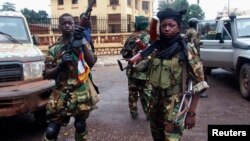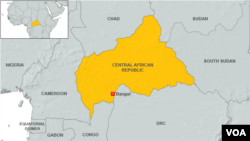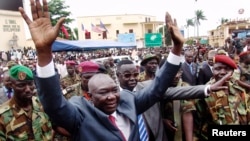NAIROBI —
Rebel leaders in the Central African Republic are struggling to rein in their own fighters, blamed for violence in the capital that has left some 20 people dead over the past week. The instability is hampering efforts to aide a needy population, according to a United Nations official in the country.
Seleka rebels are engaged in battles with armed youths loyal to the ousted president, Francois Bozize, in Bangui. Residents have complained of widespread looting by the rebels in pro-Bozize areas since the fighters took control of the city last month.
Despite promises from Seleka, leaders have failed to control their soldiers, said Amy Martin, head of the U.N. office for humanitarian affairs in the CAR.
“There has been no real movement and no real success if you will from the Seleka leadership here to try to contain their elements to try to contain their soldiers to go to barracks and to improve the security," said Martin. "So you have a general sense of lawlessness.”
Seleka’s leadership has been receptive to the concerns of the humanitarian community, said Martin, which in times of peace has difficulty reaching populations in a country that lacks sufficient roads and basic infrastructure. But the current security situation is impeding aid work, particularly outside the capital.
"It’s hindering our movement outside of Bangui by the roads, Martin said. "Seleka in the countryside has equally been looting mainly NGO and U.N. offices as well.”
The U.N. says health needs are critical in the country, as hospitals are running out of supplies. Meantime, food prices have increased up to 40 percent in some areas.
Regional powers are meeting in Chad Thursday to discuss a response to the crisis in the CAR, which may include the deployment of 1,000 additional soldiers to a peacekeeping force.
The existing multinational African force in the CAR, known as FOMAC, sent reinforcements to defend the capital against the rebels. But residents of Bangui say peacekeepers put up no resistance as Seleka swept in.
Soldiers from the national army, meanwhile, shed their uniforms and blended in with the population or joined the rebels while rebels fought off South African soldiers working with the army, killing 13.
But now as the de facto political authority in CAR, Seleka would be expected to work side by side with the peacekeepers.
Thierry Vircoulon, Central Africa director with the International Crisis Group, said it is in the group’s interest to cooperate.
“I don’t think that Seleka can object to the reinforcements of the African peacekeeping mission because at this stage Seleka’s leadership would like to be recognized internationally," Vircoulon said.
Seleka leader Michel Djotodia was named interim president Saturday by a newly-formed National Transition Council, made up of rebels, members of the opposition and supporters of the former government. The council has the task of organizing elections within 18 months.
Seleka rebels are engaged in battles with armed youths loyal to the ousted president, Francois Bozize, in Bangui. Residents have complained of widespread looting by the rebels in pro-Bozize areas since the fighters took control of the city last month.
Despite promises from Seleka, leaders have failed to control their soldiers, said Amy Martin, head of the U.N. office for humanitarian affairs in the CAR.
“There has been no real movement and no real success if you will from the Seleka leadership here to try to contain their elements to try to contain their soldiers to go to barracks and to improve the security," said Martin. "So you have a general sense of lawlessness.”
Seleka’s leadership has been receptive to the concerns of the humanitarian community, said Martin, which in times of peace has difficulty reaching populations in a country that lacks sufficient roads and basic infrastructure. But the current security situation is impeding aid work, particularly outside the capital.
"It’s hindering our movement outside of Bangui by the roads, Martin said. "Seleka in the countryside has equally been looting mainly NGO and U.N. offices as well.”
The U.N. says health needs are critical in the country, as hospitals are running out of supplies. Meantime, food prices have increased up to 40 percent in some areas.
Regional powers are meeting in Chad Thursday to discuss a response to the crisis in the CAR, which may include the deployment of 1,000 additional soldiers to a peacekeeping force.
The existing multinational African force in the CAR, known as FOMAC, sent reinforcements to defend the capital against the rebels. But residents of Bangui say peacekeepers put up no resistance as Seleka swept in.
Soldiers from the national army, meanwhile, shed their uniforms and blended in with the population or joined the rebels while rebels fought off South African soldiers working with the army, killing 13.
But now as the de facto political authority in CAR, Seleka would be expected to work side by side with the peacekeepers.
Thierry Vircoulon, Central Africa director with the International Crisis Group, said it is in the group’s interest to cooperate.
“I don’t think that Seleka can object to the reinforcements of the African peacekeeping mission because at this stage Seleka’s leadership would like to be recognized internationally," Vircoulon said.
Seleka leader Michel Djotodia was named interim president Saturday by a newly-formed National Transition Council, made up of rebels, members of the opposition and supporters of the former government. The council has the task of organizing elections within 18 months.






